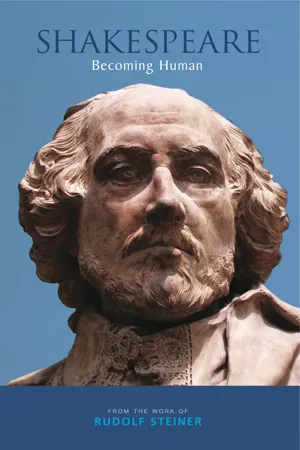
- 94 pages
- English
- ePUB (mobile friendly)
- Available on iOS & Android
About this book
'Like so much of Renaissance Art, Shakespeare's work bears an open secret. The esoteric spiritual content is undisguised, though it may be unexpected and not always immediately recognized. And, like all the great artistic achievements...this work remains incomplete until we recognize and respond to its open invitation that we become active participants.' - from the IntroductionThe perennial universal appeal of Shakespeare's work is well established. His core themes explore the challenges of the human condition whilst celebrating the potential of human beings to achieve and develop in earthly life. But what is it that enables Shakespeare's characters to live and breathe beyond the confines of their written roles, some 400 years after the plays were first performed? In these collected lectures, edited with an extensive introduction by Andrew Wolpert, Rudolf Steiner throws new light on the Bard's work, describing the on-going life that flows from it, and the profound spiritual origins of Shakespeare's inspirations. He shows how Shakespeare can enliven us in our longing for contemporary ideals and truths; indeed, in our goal of becoming fully human. Our engagement with the plays, not just as actors and directors, but also as students and members of an audience, can thus become a co-creative participation in the redemptive potential of Shakespeare's enduring legacy. Steiner speaks about Shakespeare in connection with the evolution of the arts of poetry and drama, and the transitions between cultural epochs. He reminds us of the sources and characteristics of classical Greek drama, recalling Aristotle's definition of drama as catharsis, and pointing to Shakespeare's connection to these cultural and historical wellsprings.
Tools to learn more effectively

Saving Books

Keyword Search

Annotating Text

Listen to it instead
Information
Table of contents
- Introduction
- Lecture 1 Dornach, 1 February 1920
- Lecture 2 Dornach, 24 February 1922
- Lecture 3 Stratford-on-Avon, 23 April 1922
- Rudolf Steiner's Report on the Stratford Shakespeare Festival in 1922
- Editor's Acknowledgements
Frequently asked questions
- Essential is ideal for learners and professionals who enjoy exploring a wide range of subjects. Access the Essential Library with 800,000+ trusted titles and best-sellers across business, personal growth, and the humanities. Includes unlimited reading time and Standard Read Aloud voice.
- Complete: Perfect for advanced learners and researchers needing full, unrestricted access. Unlock 1.4M+ books across hundreds of subjects, including academic and specialized titles. The Complete Plan also includes advanced features like Premium Read Aloud and Research Assistant.
Please note we cannot support devices running on iOS 13 and Android 7 or earlier. Learn more about using the app